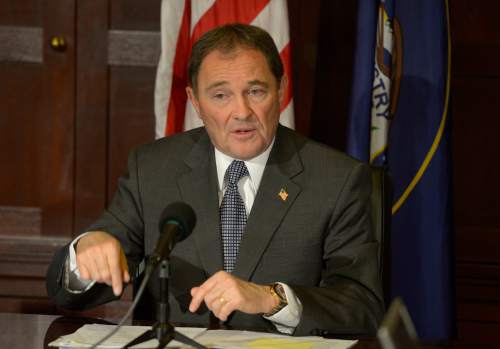This is an archived article that was published on sltrib.com in 2015, and information in the article may be outdated. It is provided only for personal research purposes and may not be reprinted.
It will take time for the state to tackle all of the issues arising out of the U.S. Supreme Court's ruling legalizing same-sex marriage across the nation, including potentially revising dozens of state statutes to conform to the decision, Gov. Gary Herbert said Wednesday.
"I think there is some uncertainty in the future, because in our statutes, in probably hundreds of places, marriage has been defined historically and legally as one man and one woman," Herbert said in an interview. "Where it bumps up against discrimination in light of the Supreme Court decision, probably we'll discover over time. It's something we're anticipating."
Herbert said his staff and legislative attorneys have listed scores of places in state law that refer to marriage or use the terms husband and wife.
"[Legislative lawyers] are taking a look, do we change them all at once? Do we do it over time? Is it going to be an evolution, or maybe a combination of all of the above?" Herbert said. "So there is some uncertainty there."
Those laws that refer to "husband or wife" give agencies enough flexibility that the law likely won't need to be changed, according to Jacey Skinner, the governor's legal counsel.
For example, the Utah Tax Commission revised its policies last year to allow married same-sex couples to file joint tax returns. And since the 10th Circuit upheld the federal court ruling striking down Utah's ban on same-sex marriage, married couples have been able to be foster parents and adopt children, which they were previously prohibited from doing.
"Any opportunity I have to place a child with a relative, I want to be able to do that when it's appropriate and right for the kid, so this decision has expanded that pool of relatives who, if they decide to get married, expands the pool for some of our kids," said Brent Platt, director of the Division of Child and Family Services.
The governor's office has identified more than four dozen sections of Utah law that will likely need to be changed, including the law making only marriages between a man and a woman valid, sections of law involving marital property and divorce, provisions governing who may adopt, several sections involving vital statistics and birth certificates, some portions of tax law, and a handful of others.
"There are some statutes that say what they say, and we can't change statute. We can only interpret it," Skinner said. "We can't just do what we want."
There is one issue in particular that the governor said his office is working through that could result in a lawsuit against the state if it can't be resolved, but he would not discuss details of the conflict.
One potential change to state law that Herbert said he doesn't like is a proposal to get the state out of the marriage business entirely. For several years, libertarian-minded legislators have quietly discussed the idea of doing away with government-issued marriage licenses, instead letting couples enter into civil contracts and allowing churches to conduct religious marriages.
Last session, a bill to do just that was drafted but never publicly released. In the wake of the Supreme Court ruling, the idea has drawn new attention.
But Herbert said government should still be involved in marriage, because there is value in having the marriage officially recognized and there are legal obligations that come with being married — such as supporting the spouse and caring for children.
"I'm not prepared to throw marriage out. One, I think there's a role for government to be involved in marriage and recognize marriage," Herbert said. "But also I think for those who say, 'Oh, let's just get out of it altogether,' it sounds like you're just angry. 'I've got a chip on my shoulder, I'm going to take my ball and go home if I can't get it my way.' I don't think that's a good attitude.
"Likewise, on the other side of the coin," Herbert said, "in the gay community there's a little spiking the football and 'In your face,' which probably isn't conducive to a good dialogue either."
Herbert spoke Wednesday at a forum on religious liberty at Brigham Young University, where he praised the collaboration between often-competing factions to compromise on a state law banning housing and employment discrimination against lesbian, gay, bisexual and transgender Utahns, while carving out protections for religious liberties.
"It was a great moment for Utah," Herbert said of the new law. "Why? Because the country needs a good role model and Utah is a good model, a positive model. … It's nice to have a state that was able to bring people together in a unique way and really ahead of the curve."



